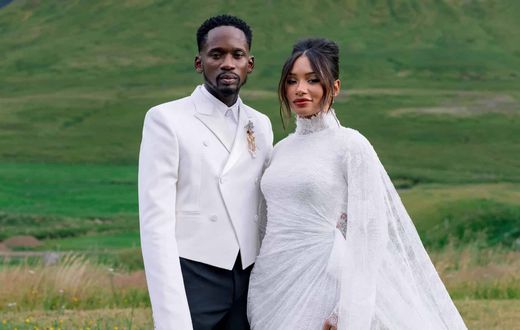Temi Otedola and Mr. Eazi’s recent wedding might have seemed like a classic showcase of celebrity romance. However, according to social media discussions and multiple entertainment commentators on X (formerly Twitter), what unfolded in the public eye soon became one of the most debated cultural moments in Nigeria in 2025.
At the heart of the conversation was Temi Otedola’s choice to adopt her husband’s surname — a decision that became a symbol for deeper arguments about gender equality, customs, class divisions, and the principle of personal agency. Many observers, as reported by Pulse.ng and contributors on Instagram, noted that the wedding moved beyond personal celebration to ignite a wider debate around feminism and tradition in Nigerian society.
Suddenly, a wide range of opinions flooded Nigerian social platforms. Each aspect of the event — from her dress to her name change, and even her upbringing as a billionaire’s daughter — was scrutinized as if it were government policy. Social media users, local bloggers, and community leaders all weighed in, turning the personal into the political.
What particularly captured public interest was, according to Lagos-based commentator Eniola Adeyemi, the unique combination of privilege and tradition inherent in Temi’s decisions. Her background as the offspring of Femi Otedola, alongside her global status, made her choices a lightning rod for discussion across both Nigerian and West African audiences.
For many, the central question became: should women universally adopt their husband’s surnames after marriage? This, according to popular opinion polls shared by Channels TV, sparked intense debate regarding how individual choices intersect with national cultural values and changing gender norms.
Yet, as the debate raged, another issue emerged — the concern that Temi’s unique experiences as a wealthy individual could be misused to set a societal benchmark for all Nigerian women. According to gender rights advocate Amara Okonkwo, this risks overshadowing the real conversation about diversity, privilege, and autonomy in women’s choices.
RELATED: Breathtaking photos from Temi Otedola, Mr. Eazi’s weddings across 3 countries

Breathtaking photos from Temi Otedola, Mr. Eazi’s weddings across 3 countries
Why Temi Otedola’s Surname Change Cannot Be a Template for All Nigerian Women
A notable trend observed by commentators on X was the frequent use of statements like: “If Temi Otedola, with all her status and influence, can change her surname for her husband, why can’t ordinary women?” This sentiment was echoed and challenged in threads by writers such as Remi Owolabi, who emphasized the dangers of overgeneralizing from individual cases.
It’s critical to consider, according to women’s rights coalition Stand To Speak, that Temi Otedola’s socioeconomic position allows her to make choices, whether traditional or not, that carry fewer risks. Her adoption of her husband’s name does not threaten her career prospects, financial independence, or social standing. This level of protection is not available to many Nigerian women.
For most women, according to NGO Gender and Justice Initiative, a surname can be much more than tradition. It can influence job opportunities, perceptions of credibility, and even safety. When these choices happen without the cushion of wealth, the ramifications can be profound and lasting.
It is therefore problematic, critics say, to judge or prescribe the choices of all women through the lens of Temi’s experience. To insist that every woman should make the same choices overlooks social context and economic realities, which is inherently exclusionary and perpetuates class divides.
EXPLORE THIS: What it means to be a feminist in today’s world

Rethinking Choice Feminism: Surname Changes and Patriarchal Structures
Among various takes, some self-identified liberal feminists on platforms such as X argued that Temi’s choice reinforced patriarchal norms and should not be celebrated as progressive. However, culture scholar Tosin Akingbade explained in an interview with The Guardian Nigeria that agency nevertheless resides in the individual’s ability to make that decision—even if it aligns with existing traditions.
A key contention raised by gender analyst Seyi Ojo is not simply about whether women take their spouse’s names, but about the broader power dynamics: would husbands be likely to adopt their wives’ surnames out of love or tradition? According to experts, the answer remains rare in Nigeria, reflecting a societal asymmetry that is hard to ignore.
Does Culture Automatically Translate to Women’s Freedom?
It is also important, various cultural historians noted, to recognize that not all communities in Nigeria follow the same customs. For example, as reported by the BBC Hausa Service, certain Northern Nigerian and Muslim communities do not traditionally require women to change their surnames after marriage.
Although this practice may seem empowering on the surface, sociologists such as Dr. Halima Mustapha point out that many women in these regions still face significant gender challenges, including early marriage customs, societal expectations around purity, and restrictions on personal autonomy. These ongoing systemic issues mean the absence of a surname change does not by itself indicate greater gender equality.
Class, Gender, and the Debate Around Temi Otedola’s Marriage Choices: Nigerian Social Media Reactions
Many conversations, particularly on popular Nigerian online forums, surfaced the notion that wealth can redefine the rules for how women are perceived when they make traditional decisions. According to digital culture analysts at Stears Business, for some Nigerian men, when a wealthy woman like Temi Otedola takes her husband’s surname, the move is seen as admirable, while similar actions by women from less privileged backgrounds are met with scorn or mockery.
Social media content creator Ibrahim Musa highlights that class bias seems to drive much of the praise or criticism offered online; it’s not just about feminism or morality, but about perceptions of status and the cultural currency of wealth. This reportedly leads to conversations where women without similar means are pressured to emulate the choices of the very rich, regardless of their circumstances.
These attitudes, according to reports on Pulse.ng, underscore the persistent tendency in Nigerian society to associate virtue with wealth, and to measure everyday women against standards set by the affluent few.
EXPLORE THIS: Does being a feminist in Nigeria require you to hate men?
Autonomy and the Core of Feminism: Why Women’s Naming Choices Should Be Respected
Most advocates agree, as stated by the Nigerian Feminist Coalition, that the foundation of gender equality is the right for women to make their own choices freely. Whether this means retaining their maiden name, adopting their husband’s, using both, or choosing an entirely new name, the decision should be respected as an expression of personal autonomy.
The challenge with the current social media discourse, as pinpointed by sociologist Dr. Osagie Igbokwe, is not just disagreement over specific choices, but the creation of a hierarchy—where some decisions are seen as prestigious and others as inferior. As a result, women who make different choices are often unfairly labeled or shamed, reinforcing limiting stereotypes instead of enabling genuine freedom of choice.
This double standard, according to commentators on Arise News, is what should be examined—not whether Temi Otedola, now Temi Ajibade, made the “correct” decision for all. Everyone’s situation is different, and judging women solely by reference to celebrity behavior fails to capture that complexity.
DISCOVER THIS: Genevieve Nnaji speaks on what feminism means to her [Video]

Reflecting on Temi Otedola’s Name Change: Lessons for Nigeria, Africa, and Beyond
Ultimately, Temi Otedola’s wedding and the surrounding debate serve as a mirror for broader issues around gender, class, and identity in modern Nigerian society. As explained by writer Uchechi Nwosu in a guest column for Quartz Africa, her personal decision is just that—personal—and should not be wielded as a measuring stick for all other women.
The true lesson, according to women’s organizations like BAOBAB for Women’s Human Rights, is not about upholding or rejecting tradition per se. Rather, it is to encourage respect for the diversity of women’s lives, backgrounds, and choices—recognizing that no one path can serve every circumstance.
If Nigerians and Africans at large can move beyond the expectation that women, regardless of background or resources, must mirror those in the spotlight, then society moves a step closer to real, meaningful freedom. What are your thoughts? Should high-profile choices guide broader social expectations, or should society focus more on individual agency and equity? Join the conversation and share your perspective below.
Food inquiries: food@nowahalazone.com
General support: support@nowahalazone.com
Story sales/submissions: story@nowahalazone.com
Follow us on Facebook
Follow us on X (Twitter)
Follow us on Instagram










